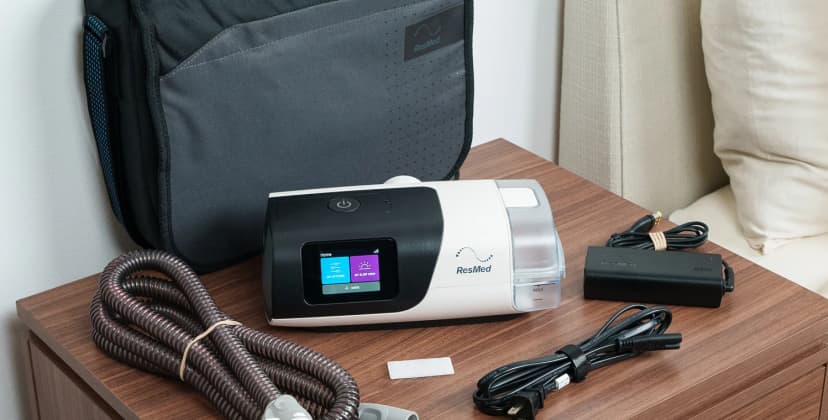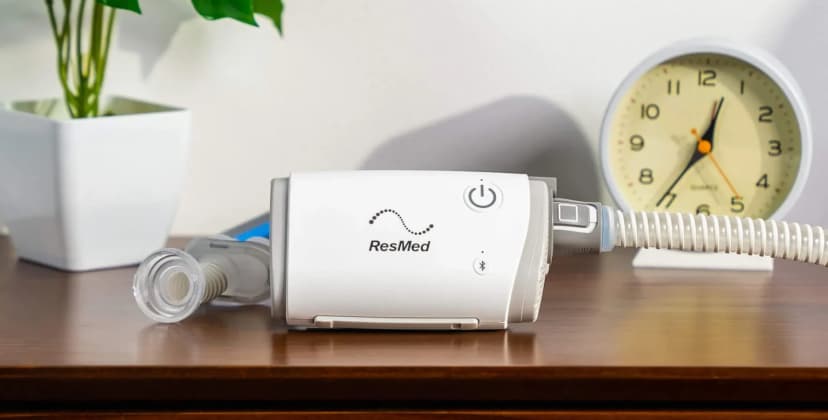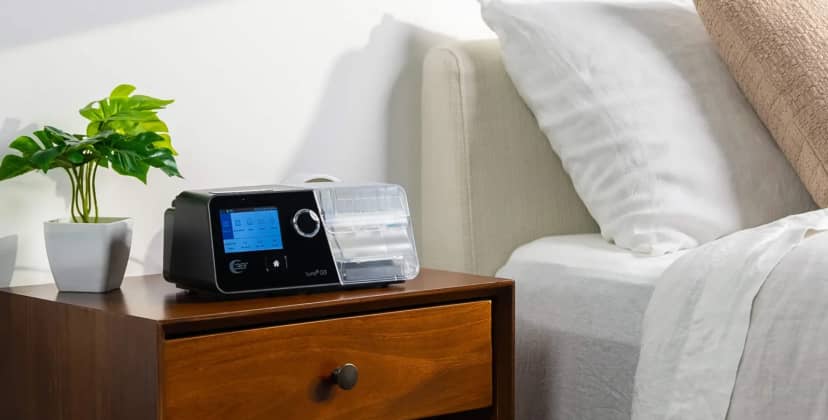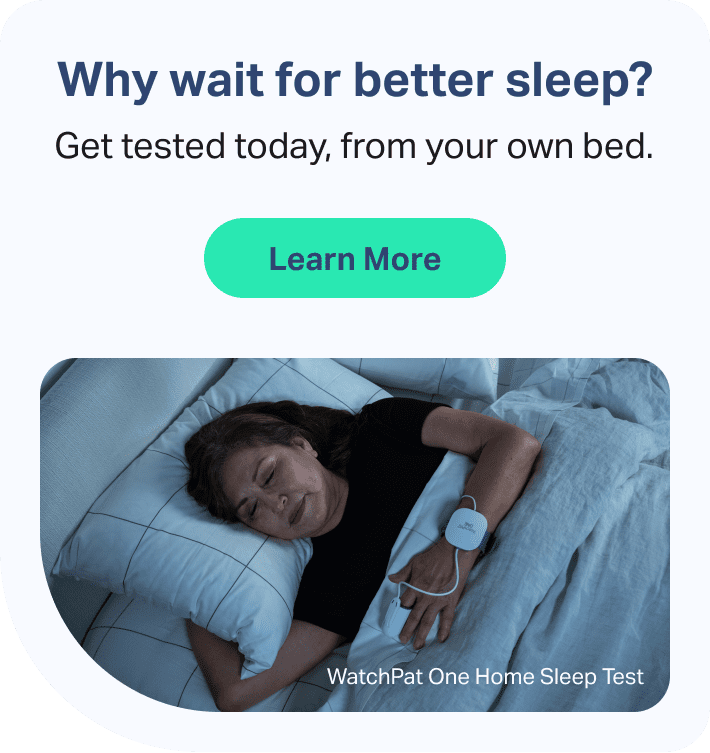When you buy through our links, we may earn a commission. Products or services may be offered by an affiliated entity. Learn more.
Best CPAP Machines of 2026
Where are you in your sleep apnea journey?
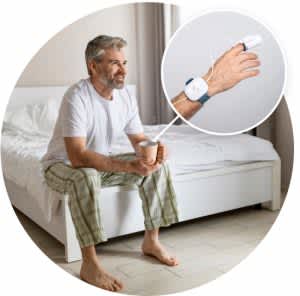
You need a prescription to buy a CPAP machine
Take an at-home sleep study to get started
- Test for sleep apnea and other sleep issues
- Results in one night from your own bed
- Receive a prescription for a CPAP machine
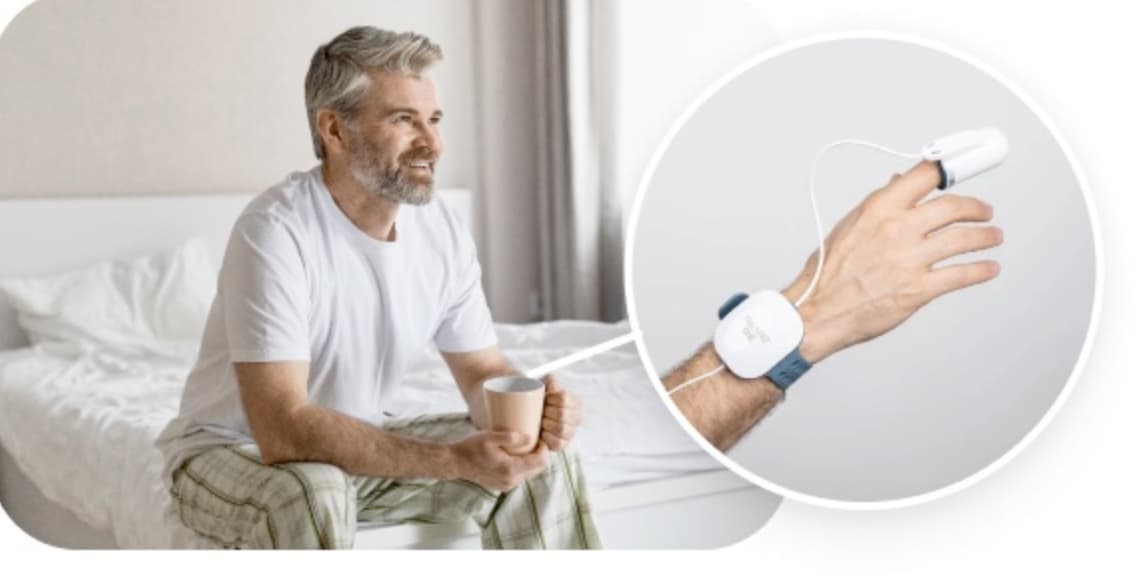
Discover expert-recommended CPAP machines
View Our PicksDiscover expert-recommended CPAP machines
Don’t have a prescription? Don’t worry, a free virtual consultation to receive your prescription is included with all the CPAP machines on the following list.
View Our PicksShopping for a CPAP machine is far from the most glamorous way to spend your hard-earned cash, but experienced CPAP users will tell you that CPAP therapy is their key to better sleep and more energized days. They’ll also tell you that the right machine can make a world of difference in your nightly comfort.
Whether you’re brand new to CPAP or looking for a replacement device, we’re here to help. Our testing team of respiratory therapists has evaluated dozens of devices, carefully analyzing their operation, features, and patient feedback to make your shopping process as efficient as possible.
Below is our list of picks for the best CPAP machines, as well as a guide about what to look for when shopping for a CPAP device.
Best Overall
ResMed AirSense 11 AutoSet CPAP Machine
Use this link for the most current ResMed discount
Shop NowThis top-rated CPAP machine has plenty of advanced features and a color LCD display.

Best Travel CPAP Machine
ResMed AirMini
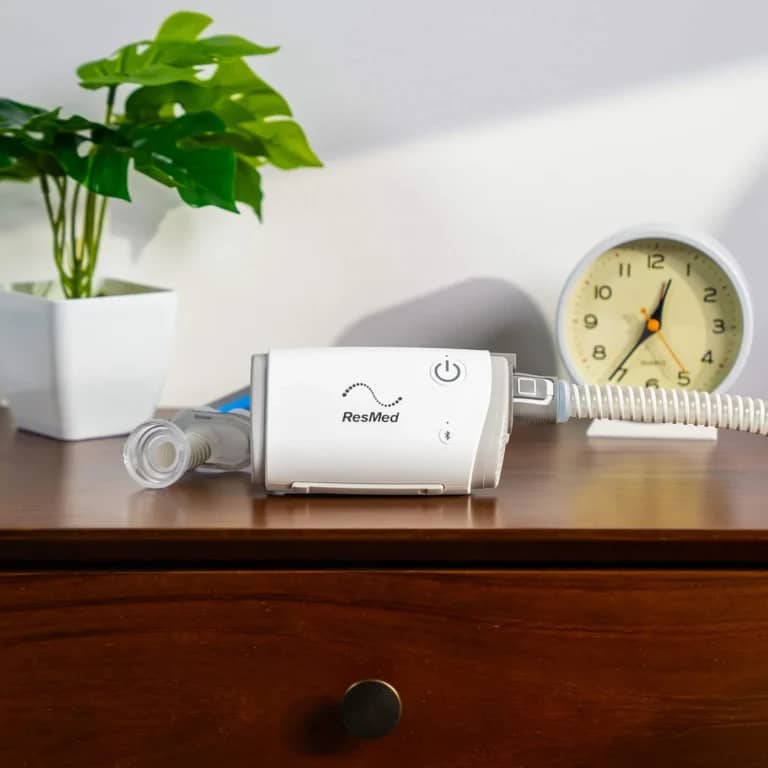
Use this link for the most current ResMed discount
Shop NowLightweight, compact, and FAA-approved, this a travel-friendly pick features waterless humidification and auto-ramp mode.
Best Value CPAP Machine
Luna G3 Auto-CPAP Machine
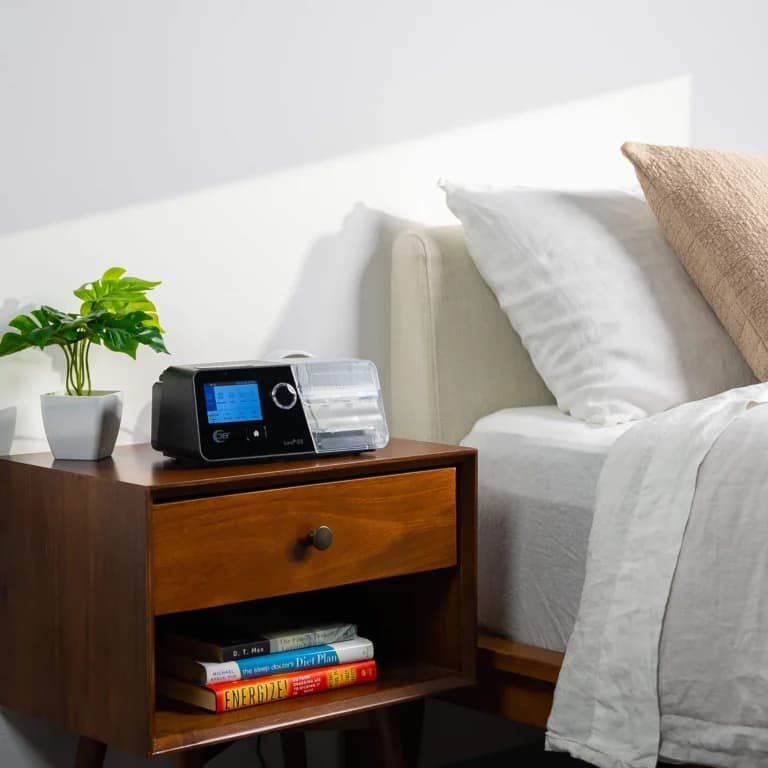
Use this link for the most current React Health discount
Shop NowA lower price tag doesn’t mean there a fewer features to help with common CPAP side effects like nasal congestion or dry mouth.
The ResMed AirSense 11 AutoSet is a state-of-the-art device designed with comfortable breathing in mind. A heated humidifier, auto-ramp option, and voice-guided tutorials for first-time users elevate the machine over many of its competitors.
Pros
Automatic pressure adjustments can help make therapy more comfortable
Heated humidifier limits dryness and irritation
Compatible with the myAir mobile app
Cons
Slightly more expensive than the average APAP machine
Advanced features are appealing but may not be necessary for all users
Our Verdict — Backed by Respiratory Therapists
Why We Picked It
The ResMed AirSense 11 AutoSet is a state-of-the-art device designed for comfortable, uninterrupted breathing. It features an auto-ramp setting, CPAP and APAP functionality, and heated humidification to reduce irritation and congestion.
Key Features
This device can meet a wide range of pressure needs with continuous or auto-adjusting air pressure settings, as well as a For Her algorithm that provides a gender-specific therapy mode. It comes with a heated humidifier and heated tubing, with built-in sensors regulate the temperature and humidity levels. It’s quiet and compact and has an easy-to-use color LCD display.
What We Don’t Like
The AirSense 11 AutoSet’s price tag may exceed the budget of some shoppers. Its advanced features may not be necessary for many CPAP users.
The ResMed AirMini is an FAA-approved machine with a compact design that’s perfect if you travel frequently. It also has other helpful features like an auto-ramp mode and a humidification system.
Pros
Compact and exceptionally lightweight
Equipped with waterless humidifier for convenience on the go
Approved for use during flights
Cons
Only compatible with certain ResMed masks, unless you purchase a separate adapter
Sound level of 29 decibels is slightly higher than other models
Our Verdict — Backed by Respiratory Therapists
Why We Picked It
The ResMed AirMini is an FAA-approved machine with a compact design that’s perfect if you travel frequently. It also has other helpful features like an auto-ramp mode, auto-adjusting pressure, and the option to use an innovative waterless humidification system.
Key Features
The AirMini weighs less than 11 ounces and measures 5.4 inches wide, so it will easily fit into most bags. It can work as a CPAP or APAP device and has a unique waterless humidification system for more comfortable sleep. It also connects to a smartphone app so you can easily access device data.
What We Don’t Like
Not all CPAP masks are compatible with the AirMini, and waterless humidification cartridges are sold separately.
React Health’s Luna G3 Auto-CPAP Machine is loaded with features to help you get the most out of your CPAP therapy. A preheat function and heated tubing can be particularly beneficial for people who experience congestion while using CPAP.
Pros
Built-in humidifier may help with dry mouth and nasal irritation
Wireless transmission via Wi-Fi, SD card, or QR code makes it easy to send data to your doctor
Lightweight design and whisper-quiet operation
Cons
Frequent pressure changes may cause some sleepers to wake up
Bulkier design reduces suitability for travel
Our Verdict — Backed by Respiratory Therapists
Why We Picked It
Even with its competitive price point, the Luna G3 Auto-CPAP Machine is loaded with features to help you get the most out of your CPAP therapy. A preheat function and heated tubing can be particularly beneficial for people who experience congestion, irritation, or dryness from CPAP therapy.
Key Features
The Luna G3 device has an auto-adjusting pressure setting, as well as a pressure ramp function. It includes heated tubing and humidification that can be set to preheat, so it’s already comfortable at bedtime. It’s exceptionally quiet and offers three different methods of data storage and transmission.
What We Don’t Like
The Luna G3 Auto-CPAP Machine is bulkier and heavier than some other leading models. Not all users need or benefit from some of the device’s advanced features.
How We Test
Our expert team of sleep care advocates and sleep product testing experts are dedicated to bringing you reliable and actionable product recommendations. We draw on decades of experience in the field of sleep health, and we personally research and evaluate the products discussed on our site.
Our picks for the best CPAP machines were developed after carefully analyzing the range of devices on the market and how their features line up with the needs of typical CPAP users. We also study verified reviews and evaluate each manufacturer’s reputation for product quality and customer service.
We also consider product recalls and warranties. Recalls are when a device is taken off the market because of a potential safety issue. Warranties provide a remedy if your device has defects in its materials or workmanship. Typical CPAP machine warranties expire after two years, but some last for up to five years.
What Is a CPAP Machine?
A CPAP machine promotes steady and uninterrupted breathing during sleep by generating a stream of pressurized air that’s sent through a hose and a mask into the upper airway. For people with sleep apnea, the flow of air is intended to prevent pauses in breathing during sleep.
CPAP is one type of positive airway pressure (PAP) device. In a CPAP, the “C” stands for continuous because the air has the same pressure level when breathing in and breathing out.
The term CPAP is sometimes used as a catchall for all types of PAP machines, but there are actually several different types of devices that may be prescribed to treat sleep apnea and other sleep-related breathing conditions.
| Machine Type | Description |
|---|---|
| Continuous Positive Airway Pressure (CPAP) | A CPAP machine provides a constant stream of pressurized air. The air pressure stays the same whether you’re inhaling or exhaling. |
| Bilevel Positive Airway Pressure (BiPAP) | A BiPAP machine can be set up to have two distinct air pressure levels: one for when you breathe in and another for when you exhale. |
| Automatic Positive Airway Pressure (APAP) | An APAP machine has built-in sensors that track your breathing, allowing the device’s algorithms to automatically adjust air pressure levels within a prescribed range. Some models also reduce pressure slightly during exhalation to make breathing feel more natural. |
| Travel CPAP | Designed for portability, a travel CPAP machine is generally light, compact, and capable of operating for several hours on battery power (purchased separately). |
Who Needs a CPAP Machine?
CPAP machines are the standard treatment for people with sleep apnea, a condition involving frequent breathing disruptions during sleep. For people with obstructive sleep apnea (OSA), they help prevent airway collapse and limiting breathing disruptions. And while CPAP may help in certain cases of central sleep apnea (CSA), other advanced devices, such as BiPAP ST or ASV, are often required.
A fixed-pressure CPAP usually requires an overnight sleep study in the lab to find the right pressure setting. In some cases, an auto-adjusting PAP (APAP) machine may be prescribed instead as the first step in treatment.
Not everyone who has sleep apnea uses a CPAP machine, however. Potential alternatives to using a CPAP machine include lifestyle changes, wearing a custom-fitted oral appliance during sleep, or having surgery.
These approaches only work in certain circumstances, and the optimal treatment depends on many factors, including the type and severity of sleep apnea you have. Only a doctor can determine whether any of these alternative sleep apnea treatments may be a viable option for you.
How Do I Choose a CPAP Machine?
Choosing the right CPAP machine can make a big difference in how comfortable and successful your sleep apnea treatment feels. The best option for you depends on factors like your prescribed pressure settings, preferred comfort features, budget, and whether you plan to travel with your device. It’s also important to consider noise level, humidifier options, data tracking, and mask compatibility.
Type of CPAP Machine
The type of CPAP device you need can make shopping a bit easier by narrowing down your options. CPAP and APAP are the most commonly prescribed for the initial sleep apnea treatment, but the right one for you depends on your specific circumstances, including which type of sleep apnea you have and how severe it is. Since these are medical devices, your doctor or a sleep specialist will normally recommend a specific kind of device for your treatment.
Pressure Range
Most CPAP and APAP devices have a pressure range of 4 to 20 cm H2O, and the average pressure setting for people with OSA is around 10 cm H2O. This means that, in terms of pressure, most devices work for most people. However, if your doctor tells you that you need an above-average amount of air pressure, you may need a device with a higher pressure range.
Pressure Ramp
If you’re concerned about how the flow of air will affect your ability to fall asleep, you may want to look for a device with a pressure ramp feature. With this setting activated (or on devices that have an auto-ramp feature), the air pressure level slowly increases over the first 30 to 45 minutes. This is intended to let you doze off while the air pressure is lower but still receive the full amount of prescribed pressure while you sleep through the night.
Heated Humidification
Warming and humidifying the airflow from a PAP machine can help reduce dryness and irritation in your mouth and nasal passages, and heated tubing can minimize condensation in the tube by using heated humidification.
Most modern PAP machines include a heated humidifier, but you should double check the product details to see if a humidifier is built into the device and whether it is compatible with heated tubing.
Noise Level
If you’re sensitive to noise in your bedroom or share a bed with someone whose sleep is easily disturbed by noise, a quieter CPAP machine is likely your best option.
The average sound level of a CPAP machine is a relatively quiet 30 decibels, or roughly the equivalent of a soft whisper. Some models are louder, especially when delivering higher levels of pressure. The quietest devices produce only about 25 decibels of noise.
Data Transfer
PAP devices record data about your usage and breathing every night. You’ll often need to share this information with your doctor, and CPAP machines have different ways of storing and transmitting data. Some machines include a wireless connection to automatically upload your data to a cloud-based platform or mobile app. For other machines, the data is saved on a removable SD card, and you have to connect the card to a computer to access the data.
As you compare models, consider how often you expect to send data to your doctor and how much you prioritize the convenience of wireless transmission.
Pricing and Insurance
The cost of PAP machines varies widely, with models running anywhere from $500 to $3,000 depending on the brand, type of machine, and features. CPAP machines often cost between $500 and $1,000. APAP and BiPAP devices are usually more expensive.
In many cases, health insurance providers, including Medicare and Medicaid, will cover some of the cost. Coverage may require you to submit data showing that you are regularly using and benefitting from PAP therapy. Many online CPAP retailers don’t accept insurance, so check with your insurance provider to see if they’ll provide reimbursement.
If you’re paying out of pocket, find out whether any accessories are included with your CPAP machine. If not, you’ll need to account for some essential accessories in your budget.
What CPAP Accessories Do You Need?
In most cases, you’ll be provided with an initial set of key accessories so that you can get started with CPAP therapy. Essential CPAP accessories include:
- A CPAP mask
- Cushions to help the mask create a seal on your face
- Headgear to hold the mask in place
- Tubing that connects the mask to the CPAP device
- Filters that help purify the air you inhale
- Cleaning materials
Optional CPAP accessories include:
- Heated tubing that helps humidify the flow of pressurized air
- Hose holders that help position the tubing while you’re in bed
- A CPAP pillow designed to accommodate your head and neck while wearing a CPAP mask
- A travel case
- A rechargeable battery
How Do I Buy a CPAP Machine?
Before you can buy a CPAP machine, you need a prescription from a doctor. Once you have a prescription, you can shop either online or in person. You will often find the best prices and largest selection from online CPAP retailers. When buying online, make sure to look carefully at details about shipping, returns, and customer support.
You can also buy a CPAP from a physical store. Sometimes your doctor or insurance company will refer you to a local medical equipment retailer that sells CPAP machines.
Physical stores typically have a smaller selection but may simplify the process and give you an opportunity to see what a particular model looks like in person. If you have any issues with your device, you may need to work with the retailer directly, so it’s worth the effort to look into their reputation.
In-Depth CPAP Guides
If you’ve been prescribed a BiPAP machine or are seeking a travel CPAP machine to supplement your everyday device, check out our expert picks for these categories. We’ve also included links to our reviews of several popular machines if you’d like to explore these models in more detail.
PAP Machine Guides
PAP Machine Reviews

Still have questions? Ask our community!
Join our Sleep Care Community — a trusted hub of product specialists, sleep health professionals, and people just like you. Whether you’re searching for the perfect mattress or need expert sleep advice, we’ve got you covered. Get personalized guidance from the experts who know sleep best.


